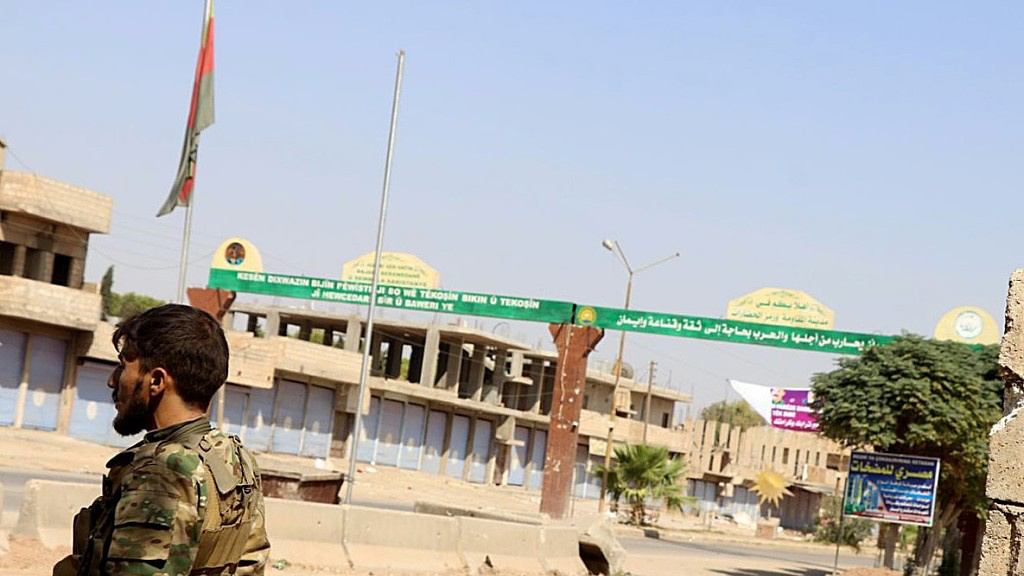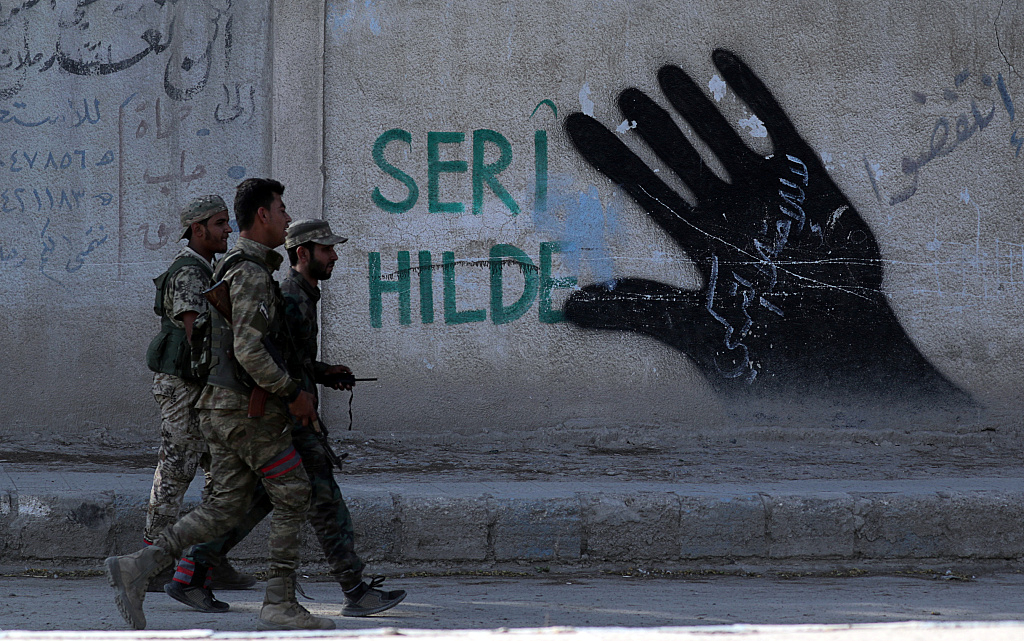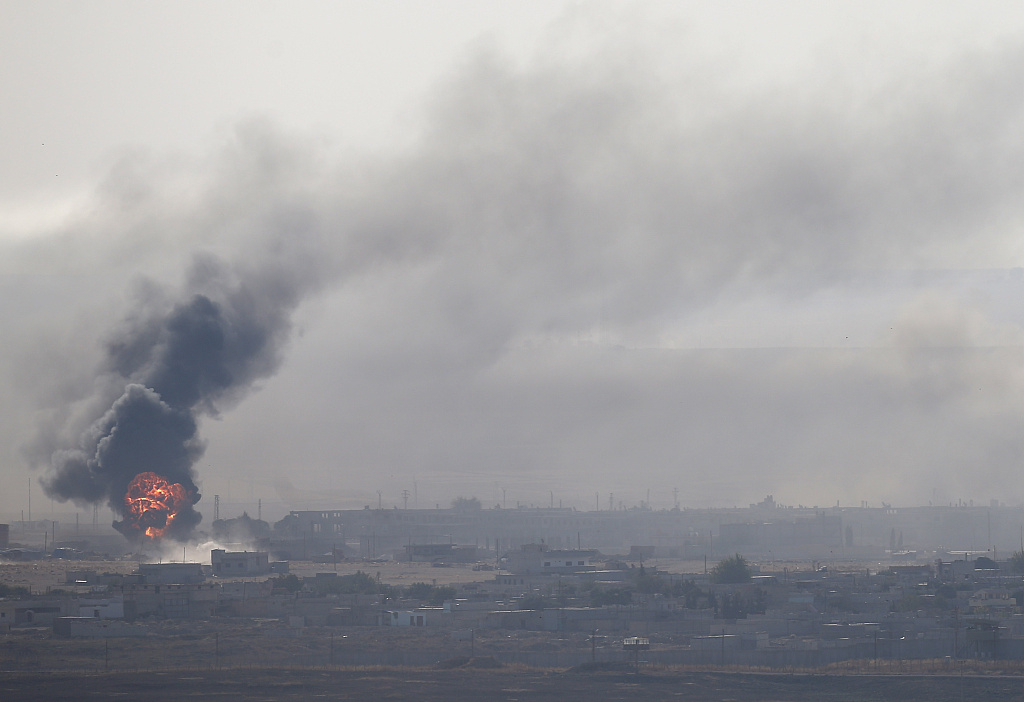
Editor's note: Zhao Yuanzhen is an opinion editor with CGTN Digital. The article reflects the author's opinions, and not necessarily the views of CGTN.
It has almost been a week since Turkey's military offensive started in north Syria, and there has been no sign of stopping. The Kurds' alliance with the Syrian government has just added another layer of complexity to the current situation. It is reported that the Kurds have struck a deal with Damascus and the Syrian government would deploy troops in north Syria to resist Turkey's attack.
Li Weijian, a research fellow at the Shanghai Institutes for International Studies and the vice president of the Chinese Association of Middle East Studies, pointed out that the current alliance between the two sides is a realistic choice for both parties. The Kurds can't resist the Turkish offensive without America's backing. As America's troops have been withdrawing from north Syria, the Kurds must form an alliance. For the Syrian government, it would not allow Turkey, at least not publicly, to challenge its national sovereignty.
Also, Turkey aims to establish a "safe zone" to settle refugees and Syrian rebel groups in north Syria to facilitate their return. So if Turkey's goal is achieved and these rebel groups do return, it will be another headache for the Syrian government.

Turkey-backed Syrian rebel fighters walk in the town of Tal Abyad, Syria, October 13, 2019. /VCG Photo
Turkey-backed Syrian rebel fighters walk in the town of Tal Abyad, Syria, October 13, 2019. /VCG Photo
Will the current alliance be able to resist Turkey's operation? According to Liu, it mainly depends on how long the offensive will last. Although Turkey would not withdraw at least in a short time, the alliance will still put pressure on Ankara. Although Turkey claims that its target is the Kurdish forces who are trying to split the country, its action to start military operations in another sovereign state would still raise the question of international legitimacy.
After the announcement of the temporary alliance, some observers worry that Iran and Russia, who have been supporting the Syrian government, will also deploy their forces. According to Li, though, Iran and Russia would not send their troops hastily to break the current balance in this region. But if Turkey continues its large-scale offensive to cross the bottom line, then other countries, including the U.S., would also take action.
"A stronger Kurdish force would be a serious concern for not only Turkey but also Iran, Iraq, and Syria," said Li. There were already lessons to be learned from Kurdish forces in Iraq, for example. During the battle between the Turkish government and Kurdistan Workers' Party (PKK), some Kurds would flee to Iraq and Turkey would cross the border to keep combating the Kurdish force. At that time, although the Saddam Hussein government claimed that they opposed the "invasion" by Turkey, it turned a blind eye to Turkey's action, as it would not want the Kurdish force in Iraq to be too strong.

An explosion is seen over the Syrian town of Ras al-Ain as seen from the Turkish border town of Ceylanpinar, Sanliurfa province, Turkey, October 12, 2019. /VCG Photo
An explosion is seen over the Syrian town of Ras al-Ain as seen from the Turkish border town of Ceylanpinar, Sanliurfa province, Turkey, October 12, 2019. /VCG Photo
As the Kurdish Democratic Union Party (PYD) has been a major force in combating ISIS, it has received a good deal of weaponry support from the U.S. to strengthen its power. Although the Syrian government has got the upper hand in the Syrian civil war, its domestic political power is still relatively weak. So it's hard to tell whether the Syrian government would include the Kurdish force in its future political arrangement-which would much encourage Kurdish forces in other countries. Both Turkish and Iraqi governments would not be happy about this outcome.
In the meantime, Turkey, Iran and Russia have arranged a summit platform to promote the Syrian peace process, so Iran and Russia would not want to worsen the trilateral relations by hastily deploying troops in northern Syria.
But again, the current balance would depend on how far Turkey would go. If there's too much weight on one side of the balance, then other parties would also not tolerate it. Li pointed out that the bottom target of Turkey is to weaken the Kurdish force in northern Syria; its goal to build a safe zone is too difficult and not realistic for now.
Turkey is also testing the reaction from the International community to decide its next move. Right now, some European countries have already voiced strong opposition to Turkey's action. If Ankara keeps pushing its line as to threaten the interest of the Syrian government, then Iran and Russia would also stand up to support Bashar al-Assad.
Trump is also facing mounting critique for his decision to pull out American troops. If Turkey's operation prolongs to trigger a stronger humanitarian crisis, Trump will not afford to lose his approval as the 2020 elections begin. He has already threatened to destroy Turkey's economy to release warning signals. "This might sound bluff to other countries, but Turkey has tasted the bitter outcome before, so it has to think twice before the next move," said Li.
(If you want to contribute and have specific expertise, please contact us at opinions@cgtn.com)